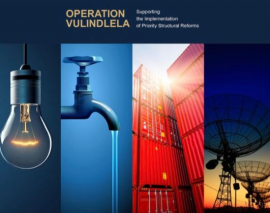
State-owned enterprise (SOE) rail and port company, Transnet, is steadily improving its performance and has made progress in improving its financial position to enable greater investment, says Finance Minister Enoch Godongwana.
The development is contained in the second quarter report of Operation Vulindlela (OV).
In the second quarter, the OV noted progress in:
- National Energy Crisis Committee (NECOM) established to oversee the implementation of additional measures to address the electricity shortage and end load shedding.
- Comprehensive review of the work visa system completed, with detailed recommendations to attract skilled immigration and investment.
- National Water Resources Infrastructure Agency Bill approval by Cabinet for public consultation.
- Backlog of water use licenses cleared.
- Revised Raw Water Pricing Strategy developed to provide policy certainty in the water sector.

OV was established in October 2020 as a joint initiative of the Presidency and National Treasury to accelerate the implementation of structural reforms.
It is a government‐wide approach through which Ministers, departments and entities implement the reforms. A Vulindlela Unit in the Presidency and the National Treasury monitors progress, addresses challenges and actively supports implementation.
OV’s five key objectives are:
- supply of electricity stabilise
- Reduced cost and improved quality of digital communications
- Sustainable water supply to meet demand
- Competitive and efficient freight transport
- A visa regime that attracts skills and grows tourism
Releasing the report on Friday, Godongwana said the country had experienced significant challenges with both the ports and rail infrastructure.
These, he said, were “as a result of security issues, inadequate investment in equipment, procurement processes that were tainted by state capture, and poor operational performance”.
He said: “However, Transnet is steadily improving its performance and has made progress in improving its financial position to enable greater investment going forward”.
This month, he said, requests for proposals in respect of private sector participation in rail are due for 16 slots made available by Transnet on the Durban-City Deep and Pretoria-East London lines.
“It is important to recognise that this is only the first step in enabling third-party access to the freight rail network,” he said.
The Minister said OV in the coming months anticipates the passage of the Economic Regulation of Transport Bill, which will establish an independent Transport Economic Regulator and enable properly regulated, non-discriminatory access to the network beyond these initial slots.
“In addition, RFPs for private sector participation in the container terminals at the Ports of Durban and Ngqura will also be issued this month, in order for partnerships to be in place by January 2023.
“This is a major step forward to enable experienced international terminal operators to invest in the expansion of infrastructure and improve the management of port operations,” he said.
The Minister said the logic of these reforms was that port and rail infrastructure would remain state-owned, while encouraging and enabling competition in operations to improve efficiency and leverage private sector investment.
“During the next quarter, we will prioritise reforms in the transport sector with the same degree of urgency with which we have responded to the energy crisis during the previous quarter,” he said.
Also speaking at the briefing, Minister in the Presidency, Mondli Gungubele, said since OV was established, government had steadily addressed constraints binding the South Africa from creating jobs and stimulating economic growth.
“We have identified the key ingredients for higher growth in South Africa,” he said.
He said if OV achieved the key five objectives, government was confident it could place South Africa on a fundamentally different growth trajectory and start creating jobs.
“This is the premise of (OV) and the reason why the President has made structural reforms our foremost priority.”
Last month, President Ramaphosa unveiled the country’s energy action plan, which was aimed at addressing power generation.
Gungubele said the actions build on the foundation that has already been laid in the energy sector over the past year.
“Certain licensing threshold was raised. The pipeline of embedded generation projects has grown to more than 80 projects with a combined capacity of over 6000 megawatts,” he said.
The joint task team set up by OV, led by Minister Godongwa, to support investment in new generation capacity has implemented several key changes.
These, he said, include designating the projects as strategic infrastructure projects and streamlining regulatory requirements.
"Through these efforts, the average time taken for registration of projects by NERSA has been reduced from as long as four months to just 19 days. The time it takes to obtain an environmental authorisation has been reduced from close to 150 days to just 57 days. Shell capacity has been built in the grid access unit within Eskom to expedite grid connection approval [for] this project to proceed as quickly as possible.
Work, he said, had already begun to ensure that the energy action plan was swiftly and fully implemented. – SAnews.gov.za


